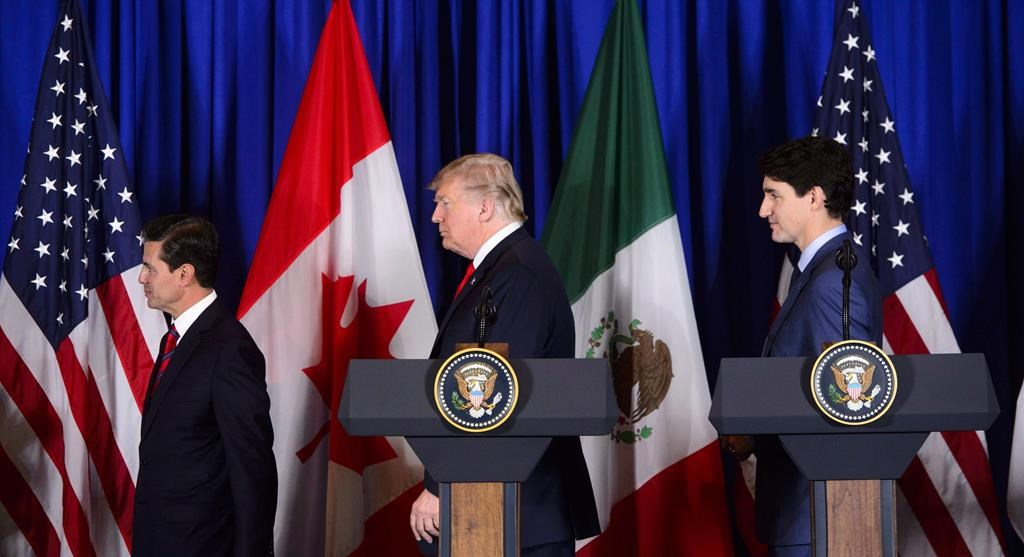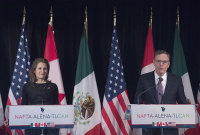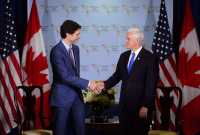Support strong Canadian climate journalism for 2025
The U.S. House of Representatives began its summer break today leaving the ratification of the new North American trade deal hanging, rekindling angst that a frustrated President Donald Trump will blow up the existing pact.
Trade experts in Canada and the U.S. are divided on whether Trump may be driven to invoke the six-month notice period to withdraw from the current North American Free Trade Agreement — a threat he repeatedly made during the tense renegotiation of the pact that he pushed on Canada and Mexico.
Mexico is the only country to give full legal approval to the new United States-Mexico-Canada Agreement, or USMCA, when its Congress recently ratified the deal.
But Canada is waiting to see what the U.S. Congress will do and with the Democrats controlling the lower House, no ratification bill was tabled there before lawmakers broke for their five-week summer recess on Friday — a scenario Trump and his cabinet worked hard to avoid.
The Democrats want changes to the USMCA's provisions on labour, environment, patent protection for drugs and enforcement, and have by all accounts working hard with Trump's trade czar Robert Lighthizer to move forward.
But they haven't reached an agreement that would persuade the Democrats to bring a bill forward in the House.
That makes it all but certain that U.S. lawmakers won't be in a position to take even the most tentative steps forward on the deal before the start of Canada's federal election campaign, which is set to begin by mid-September at the latest.
For some, that could mean fireworks for the Canadian campaign — ignited by a petulant Trump.
Cyndee Todgham Cherniak, a Toronto-based international trade lawyer, said the Democrats are likely to want substantive changes that could leave the deal in limbo for many months. In the meantime, the Democrats will be sharpening their talking points on USMCA to use against Trump in the 2020 U.S. election, she said.
And that could set Trump off, she said.
"Trump was hoping that Prime Minister (Justin) Trudeau would be able to assist him with getting the Democrats to pass the USMCA through Congress," said Todgham Cherniak.
"He might say that Prime Minister Trudeau was not effective in getting Congress to pass the USMCA prior to now. And if they don't come back until September, and if the Democrats want to use this as a talking point in connection with the U.S. election, he might lash out at the Trudeau government."
Trudeau met Democratic House Leader Nancy Pelosi on Capitol Hill after his White House meeting with Trump last month. Trump, at the time, said he was pleased Trudeau would be talking to Democrats.
Lawrence Herman, a Toronto international trade specialist, said it is unlikely Trump would pull the plug on the new NAFTA so close to his own election campaign because it would sow economic uncertainty that wouldn't benefit him politically.
"There is huge Republican and business antipathy to any move by Trump to notify NAFTA withdrawal, quite apart from the serious legal issues as to whether he could withdraw without Congressional approval," said Herman.
"As well, if as many experts believe, the U.S. is heading into a period of economic sluggishness, the threat of NAFTA withdrawal and the uncertainty that would unleash in the period leading up to the 2020 election would probably be a disincentive to Trump embarking on such a move."
Dan Ujczo, the Ohio-based trade specialist with the firm Dickinson Wright, said it is unlikely Trump would serve notice to withdraw, but even if he did, Congress or the courts could step in to delay that.
"The NAFTA will be in place through 2019. It is unlikely that companies will face a scenario where neither the NAFTA nor USMCA is in place during 2020," he said.
"The question remains how much disruption will occur along the way. The president seems increasingly unwilling to threaten his greatest success — the economy — and that weighs in favour of no NAFTA withdrawal."
Adam Austen, the spokesman for Foreign Affairs Minister Chrystia Freeland, said the minister will continue to speak to members of Congress from both parties.
"Our goal remains to move in tandem with the U.S.," he said.





Comments